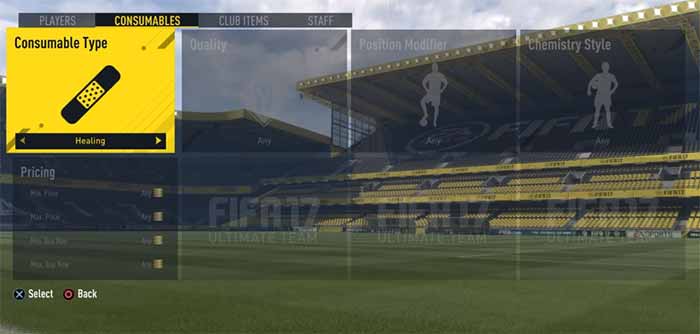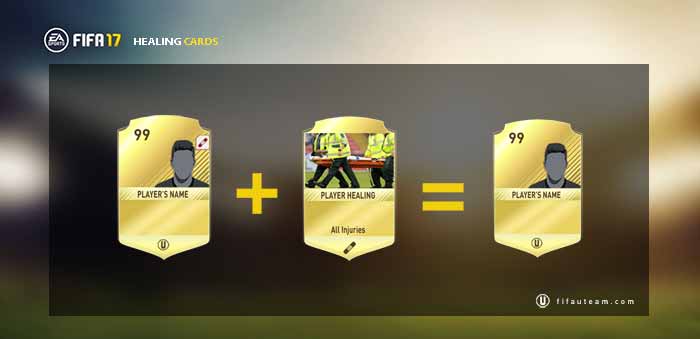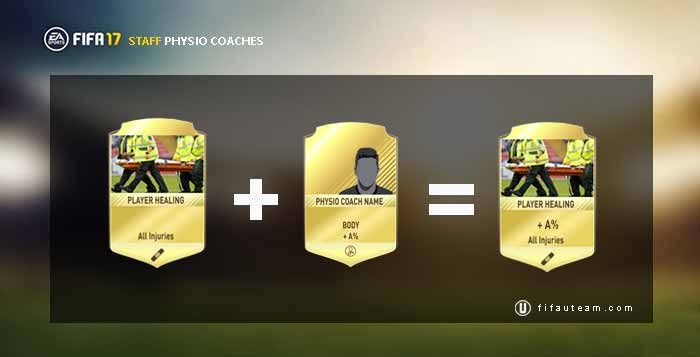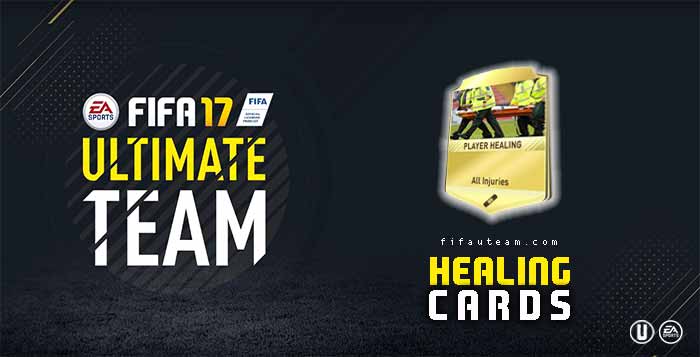Learn everything about FIFA 17 Healing Cards, including how they work, a list with all these cards and a guide to help you decide if you should use them or not.
Quick Access
Roles
What FIFA 17 healing cards do?
Any player can get hurt in a match. The chances of it happening are higher if he has low fitness and if the opponent uses an aggressive playing style. When it happens, there are two specific pieces of information that will appear printed on his card: the number of matches he will be missing and what kind of injury he’s got. If you leave him to rest among the reserves for as long as the period of the injury, he will heal naturally and become available again.
Fitness cards are useless if a player has an injury. In this case, you’ll have to apply a healing card if you want to use this player immediately, or you can at least reduce his downtime. This is the only role of healing cards. It is possible to recover any injured player if you apply on him the right healing cards.
There are two types of healing cards: the ones that are specific for each type of injury (foot, leg, knee, arm, head, back or upper body), that can reduce up to 5 matches, and the ones that cure a player no matter which type of injury he’s got, reducing the wait up to 4 matches. When you use one of these cards, the number of matches written on the player’s card is reduced according to its level. If the difference between them is equal to or less than zero, you’ll be able to use the player right on. If the difference is superior, you can keep applying healing cards until you have your player completely healed or you can wait until he recovers naturally in the remaining downtime.
In FIFA 17 Ultimate Team, the cards of injured players have an ‘X’ on it. It is not possible to apply a healing card on players who are not injured. On the other hand, you can apply as many healing cards as you wish on injured players.
 Follow this path to buy healing card: transfers – consumables – healing
Follow this path to buy healing card: transfers – consumables – healingList of FIFA 17 Healing Cards
Every single healing card included in FIFA 17
There are only 24 healing cards into FIFA 17:
| HEALING CARDS | |||
| BRONZE | SILVER | GOLD | |
| NON RARE | |||
| FOOT | +1 | +2 | +5 |
| LEG | +1 | +2 | +5 |
| KNEE | +1 | +2 | +5 |
| ARM | +1 | +2 | +5 |
| HEAD | +1 | +2 | +5 |
| BACK | +1 | +2 | +5 |
| UPPER BODY | +1 | +2 | +5 |
| RARE | |||
| ALL | +1 | +2 | +4 |

Importance
Should I buy FIFA 17 Healing Cards?
If you usually keep your squads fitness high and if you avoid aggressive opponents, then injuries are very rare. Even if it happens, the downtime will be only one or two matches. That’s why there is no reason to use gold healing cards which reduce the downtime in 5 or 4 matches.
The silver and bronze healing cards should only be used if you really need a player in particular that’s got an injury. Most of the time you can avoid using healing cards, if you own a quality squad that allow you rotation. You will be able to put the injured player in the reserves and replace him with another one.
The rare healing cards are more expensive than the other ones. They heal the player, no matter the type of injury he has got. So why would someone be buying them? Imagine that your player is injured and you want him back. What do you do? You check which kind of injury he has, go to the transfer market, buy the specific non-rare healing card and apply it on him. Sometimes it is too boring to have to stop playing to go to the market to buy healing cards. That’s why some gamers buy rare healing cards to use when they need. It is more expensive but it is also easier.
If you have stored physios on your club, you will get a bonus up to 50% when you apply a healing card.

